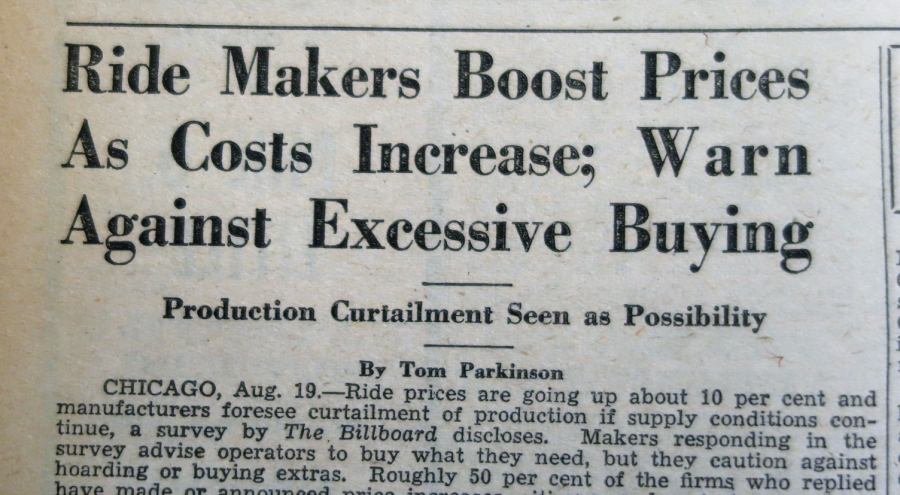Tim’s Turn: Sharing Is Caring

Hoarding has become a word often used during 2020 as a shameful action. Earlier this year, the panic buying of toilet paper—with people buying as much as they could pile into their shopping carts—was seen by many as unpatriotic.
Hoarding isn’t a new thing. Can you imagine a time when the largest manufactures of amusement rides and parts openly asked operators to not buy any more rides or parts than they specifically needed at the time? Stockpiling, they warned, would only make a potential shortage situation worse. “Buy essentials, but no extras” was their advice. Operators were cautioned against hoarding.
Think back to August 1950, only a few months after the start of the Korean War. News of price increases and a possible shortage of parts created panic buying within our industry. With a conceivable shortage of steel due to the war efforts, manufacturers surveyed by Billboard Magazine noted several troubling issues, including rising labor costs, higher cost of materials, and major delays in the supply chain.
Ride purveyors who were polled by the magazine announced that prices on their rides were going up about 10% and foresaw potential curtailment of production if supply conditions worsened. Most noted that higher ride prices and potential ride shortages were a certainty if the Korean War continued.
I ran across this information as I was flipping through the Aug. 26, 1950, issue of Billboard and stopped when I saw the headline: “Ride Makers Boost Prices; Warn Against Excess Buying.” I find it interesting to see that ride makers took the position that discouraged excess purchases—even from existing inventory—for the betterment of all operators. Hats off to our patriotic manufacturers of yesteryear.
The consensus was that if everyone only bought the parts they needed for maintenance and to not hoard,

parts would be available for all. New ride availability, however, was anyone’s guess at that point. One maker noted that new production totally depended on government action regarding allocation of steel and other materials.
Harry Traver of Traver Enterprises told Billboard, “If the war goes on, all ride manufacturing must cease.” He then advised potential buyers of his equipment, “Sit tight or buy sparingly for delivery now.”
H.L. Selner, builder of Tilt-A-Whirls, advised his clients to “take delivery of what is needed now, but don’t speculate.”
Ben Roodhouse of Eli Bridge Company added that if one operator buys extras, another operator won’t be able to acquire what he really needs. How many times have we heard similar pleas this year from grocery stores?
There was a reason for these declarations. Sales, usually soft during August, were at near record high levels for several firms due to buying in anticipation of shortages that a government mandated material freeze could cause, indicated Bill de L’horbe Jr. of National Amusement Device Company. He speculated that he felt the outdoor amusement industry would be declared essential by the government and that parts would have priority although new ride production could be halted. In August, all were still waiting for a clear-cut government decision on allocating materials.
The message the manufacturers were declaring was unusual, but it showed heart. They were asking people to think about their fellow ride operators. They were acknowledging that everything you buy, that you don’t immediately need, could affect someone else who needs that one little part to stay in business. Be reasonable. Sounds like they are using a popular current anti-hoarding slogan: Sharing is Caring.
Some concepts stand the test of time. We can learn a lot from history.
Tim O’Brien is a veteran outdoor entertainment journalist and is a longtime Funworld contributor. He has authored many books chronicling the industry’s attractions and personalities and is the only journalist in the IAAPA Hall of Fame.
